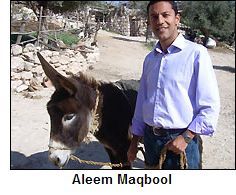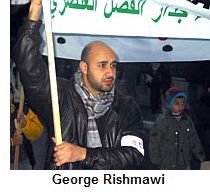 In June 2008, HonestReporting questioned BBC journalist Aleem Maqbool’s account of an incident in Ramallah where he said a Palestinian “militant” was dragged out of cafe and killed, execution-style, by IDF soldiers operating from armored vehicles. We found Maqbool’s version did not match up with accounts from human rights organizations and even other media outlets, demonstrating not only a lack of journalistic objectivity but also a breathtaking naivety about the reliability of Palestinian “eyewitnesses.”
In June 2008, HonestReporting questioned BBC journalist Aleem Maqbool’s account of an incident in Ramallah where he said a Palestinian “militant” was dragged out of cafe and killed, execution-style, by IDF soldiers operating from armored vehicles. We found Maqbool’s version did not match up with accounts from human rights organizations and even other media outlets, demonstrating not only a lack of journalistic objectivity but also a breathtaking naivety about the reliability of Palestinian “eyewitnesses.”
Now, Maqbool is walking from Nazareth to Bethlehem, retracing a journey made by Mary and Joseph in the New Testament story of Jesus’s birth. Maqbool follows in the footsteps of other journalists such as The Times’s Stephen Farrell, The Guardian’s Rory McCarthy and the BBC’s own Matthew Price, whose December 2005 report was described by Israeli Foreign Ministry sources as one of the most dreadful ever broadcast by the BBC (something of an achievement considering the amount of BBC anti-Israel output).
Maqbool attempts to treat his journey, complete with donkeys, as a personal road trip rather than the blatantly politicized efforts of journalists such as his colleague Price. Unfortunately, he over-romanticizes the Palestinians while portraying the IDF in a sinister light, exerting a strong but subtle bias.
EXTREMIST TRAVELLING COMPANIONS:
 Maqbool spends some time travelling with George Rishmawi who “is passionate about walking through the region and has done extensive research into biblical sites here…” Maqbool fails to mention that his companion also happens to be a co-founder of the International Solidarity Movement, the well-organized movement that spreads anti-Israel propaganda and misinformation and voices support for others who engage in armed resistance against Israel.
Maqbool spends some time travelling with George Rishmawi who “is passionate about walking through the region and has done extensive research into biblical sites here…” Maqbool fails to mention that his companion also happens to be a co-founder of the International Solidarity Movement, the well-organized movement that spreads anti-Israel propaganda and misinformation and voices support for others who engage in armed resistance against Israel.
George Rishmawi, via his local organization Grassroots International Protection for Palestinians, helps coordinate and train ISM volunteers once they arrive. Since 2001, hundreds of ISM volunteers have placed themselves in front of Israeli Army vehicles, removed concrete boundaries from roads, confronted Israeli troops, and in some cases, stayed in the homes of suicide bombers.
Did Maqbool happen to stumble upon Rishmawi during his journey and did he really not think Rishmawi’s background relevant?
NO ROOM AT THE INN?
Unlike Joseph and Mary, Aleem Maqbool has no trouble finding accomodation during his journey. He stays with Palestinians who are only too willing to tell stories of suffering at the hands of the Israelis, such as the family in Bir Zeit who talk of land confiscations and arrest raids.
Perhaps this is no coincidence. For among George Rishmawi’s roles is the head of the Alternative Tourism Group, which specializes in giving tours that “allow the Palestinians to present their own views and culture” to visitors from abroad, portraying Palestinians as victims of unyielding Israeli oppression and brutality.
Alternative Tourism was established to greet and aid ISM volunteers who come to Israel. In April 2003, two Pakistani Muslims from Great Britain entered Israel through Jordan as clients of Alternative Tourism; they met with ISM leaders for an entire day in Gaza before proceeding on to Tel Aviv, where they bombed a popular beach bar, Mike’s Place, killing three people.
Was Maqbool’s entire journey coordinated with George Rishmawi and the Alternative Tourism Group?
SUBTLE BIAS AND SELECTIVE CONTEXT:
Maqbool doesn’t directly attack Israel. He doesn’t have to. The bias in his diary is much more subtle. With little or no mention of Palestinian terror, the Israeli army is portrayed as a faceless entity that carries out arbitrary actions:
But the Israeli army has also arrested and killed hundreds of people it suspects of militancy, in regular raids on West Bank towns and cities.
Of course, “militancy” is such an all-encompassing and meaningless term that it cannot do justice to the legitimate counter-terror operations that the IDF carries out to protect Israeli citizens.
Again, Israelis are portryed as malevolent:
From al-Badhan, the “Journey of Death” trail started. It is called that, not just for its long, steep, rocky climbs, or the fact that Israeli snipers frequently use the mountain tops …
Even when Maqbool puts a human face to IDF soldiers, it is tinged with bias. He has a pleasant chat with a soldier at a checkpoint:
It was a reminder that at the checkpoints I go through almost daily – behind the uniforms, the shouted orders in Hebrew, and the guns – are many personable young people, doing the job they are told to do.
Are Israeli soldiers automatons who merely follow orders or are they something that Maqbool cannot comprehend? – young men and women proud to serve and protect their country against the daily threat of terrorism without being forced to do so.
HISTORICAL REVISIONISM:
Maqbool visits Jenin and once again misses out vital context:
The road to Jenin from the West Bank’s border with Israel began as quite a desolate walk this afternoon. Once, this was a busy area of trade, but the shops were all destroyed in an Israeli invasion six years ago.
Maqbool refers to Jenin’s refugee camp:
Until recently, it was a militant stronghold, even after large parts of the camp were destroyed in an Israeli invasion six years ago.
An “Israeli invasion” again draws images of arbitrary actions. Has Maqbool deliberately forgotten that this so-called “invasion” was the 2002 Operation Defensive Shield carried out in response to the Palestinian terror campaign that had cost the lives of 125 Israeli civilians and wounded hundreds more? The operation was launched following the Passover massacre at the Park Hotel in Netanya.
In addition, while Maqbool claims that “large parts of the camp were destroyed,” this was not the case. As aerial photos showed, only a small part of the refugee camp was affected.
Visiting Joseph’s Tomb in Nablus, Maqbool states:
In 2000, Palestinian youths used the site as a focus for demonstrations against Israeli occupation, which led to clashes with Israeli troops there. In October of that year, in an infamous episode, 17 Palestinians and an Israeli soldier were killed.
Soon after, the army pulled out and stopped having a permanent presence at the site, which a group of Palestinians then burned and ransacked.
In fact, these so-called “youths” did more than simply demonstrate. The small contingent of IDF border policemen at the site were attacked with gunfire, stones and firebombs over the course of a number of days, despite Palestinian Authority pledges under the Oslo Accords to protect the holy site, which they then allowed to be destroyed.
Maqbool expresses his bias by writing about his “hope” that he will be permitted to cross the checkpoint from Israel to the West Bank – even though he knows that his British passport and an Israeli Government Press Office press card should guarantee him free passage, albeit with the normal security checks that would be carried out at an Israeli crossing point.
In the event, it is the donkey that falls victim to Israeli bureaucracy and is not allowed to cross without the correct paperwork. But while this may elicit some humor, the abuse of donkeys for terror attacks is a sad reminder of why IDF soldiers have to be so vigilant.
Aleem Maqbool claims that “the notion of a walk from Nazareth to Bethlehem is, for me, a romantic one.” Even if that is his primary motivation, his diary exposes his own prejudices. The BBC will no doubt claim that this project is a personalized account of Maqbool’s journey, much in the same way that BBC journalist Barbara Plett shed tears for Arafat. If so, then Maqbool has merely allowed us an insight into the mind of a typical BBC correspondent operating in the region.
You can send your comments to the BBC Complaints website – http://www.bbc.co.uk/complaints (for detailed instructions on how to navigate the BBC Complaints website, click here).

